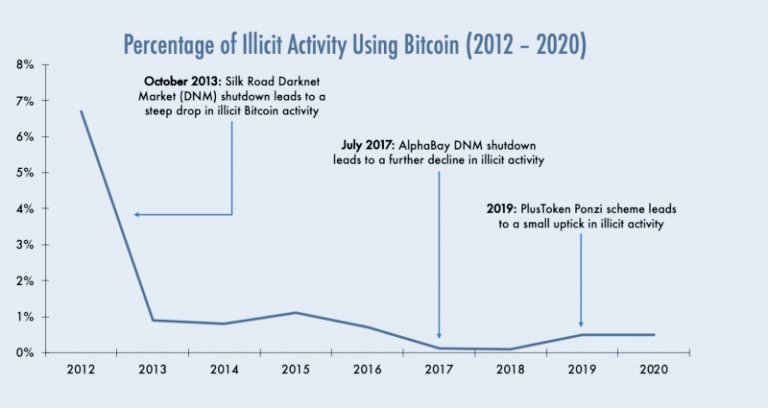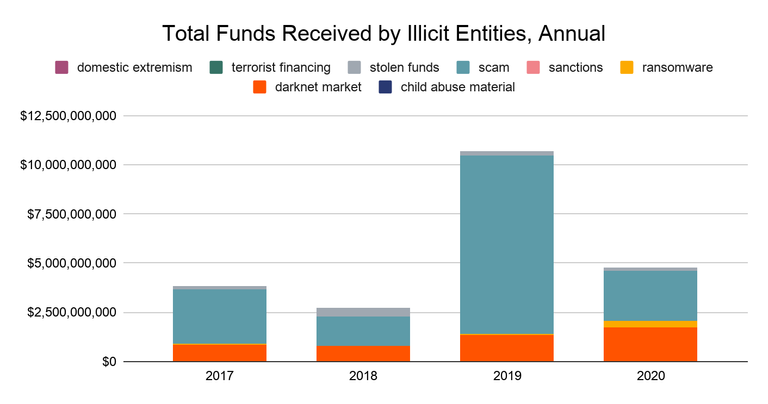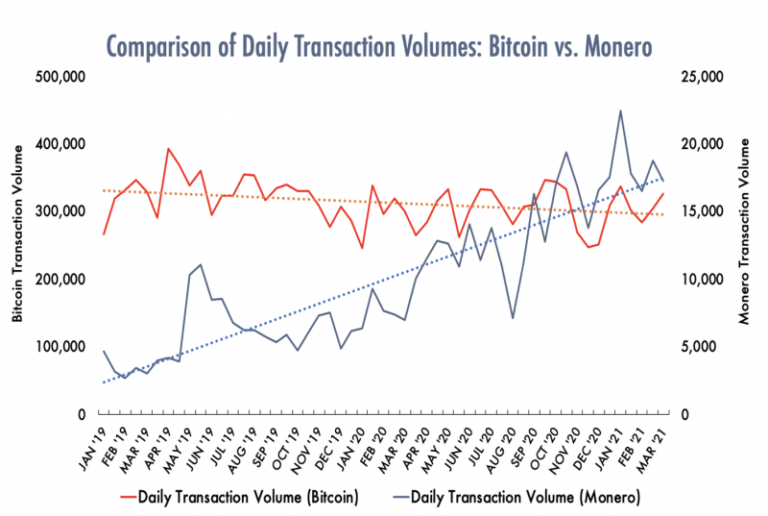It is however pleasing to have read through a few articles diving deep on cryptocurrency and it's supposed illicit usage. This has been a famous standpoint when it comes to laying out the demerits of cryptocurrencies when underneath its protocols lies forensic tools giving much more relevance to the utility of blockchain technology. When it comes to financial sectors and its operations, there are always bound to be frameworks set up for criminal activities, this makes no difference when it comes to cryptocurrency and it definitely isn't going to stop especially for the development of Anonymity-Enhanced Cryptocurrencies such as monero.

That said, the usage of bitcoin particularly for illicit activities, Ransomware for the most recent talks has been utterly ridiculous. If we're to place the traditional Banking system up against cryptocurrency in terms of illicit activities, the numbers are definitely far off the charts to favor these fraudulent systems. During the 2013 silk road darknet shut down period, the highest volume of illicit transactions on the bitcoin network, accounting to about 7% of global illicit transactions records, this has since time dropped drastically as more crypto and blockchain education met the masses. Truly, ignorance had long fueled the system and its sentiment and this tends to continue as the government still lays far behind in terms of recognizing the usefulness of blockchain technology.
"The broad generalizations about the use of Bitcoin in illicit finance are significantly overstated."
"The blockchain ledger on which Bitcoin transactions are recorded is an underutilized forensic tool that can be used more widely by law enforcement and the intelligence community to identify and disrupt illicit activities. Put simply, blockchain analysis is a highly effective crime fighting and intelligence gathering tool."
This is quoted from thecipherbrief reports on bitcoin illicit activities MICHAEL J. MORELL did a great job bringing in pieces of the puzzle to give a clearer picture on the subject matter. Cryptovirology having creeped into the system by deploying a famous malware called Ransomware, designed unlike other computer malwares like worms and Trojans which get mixed up with computer files thereby corrupting them, Ransomware only encrypts users files, making them inaccessible until a ransom is paid to decrypt them. This has been publicly discussed to be growing rapidly fast, but onchain analysis has however countered those shit talks. Crypto scams are far more possessing the network than the recent Ransomware talks filling the air. According to chainanalysis scams made up the majority of all cryptocurrency-related crime at 54% of illicit activity, representing roughly $2.6 billion worth of cryptocurrency received. However, both the raw value and share of all criminal activity represented by scams is much smaller than in 2019, as there were no scams in 2020 comparable to those like the enormous PlusToken Ponzi scheme, which took in over $2 billion from millions of victims. Darknet markets were once again the second-largest crime category, accounting for $1.7 billion worth of cryptocurrency activity, up from $1.3 billion in 2019. However, the big story for cryptocurrency-based crime in 2020 is ransomware. That may sound counterintuitive, as ransomware accounted for just 7% of all funds received by criminal addresses at just under $350 million worth of cryptocurrency. But that figure represents a 311% increase over 2019. No other category of cryptocurrency-based crime rose so dramatically in 2020, as Covid-prompted work-from-home measures opened up new vulnerabilities for many organizations. These numbers are barely hitting a million dollars on a monthly chart, though one may say that this only accounts for "seen" operations, but if that be the case, the crime rate in the traditional banking system is way off the mountains and this isn't an exaggeration. In my course of research, I've come to realize that sooner or later, the government of the world will pretty much fancy bitcoin to every other cryptocurrencies, why? While blockchain technology comes with its open source merits, the development of privacy coins which makes tracing transactions more difficult becomes the actual threat. Terrorists are beginning to migrate to these networks and they most often request for ransom on monero, the reason here is clear, because while BTC transactions remain traceable, monero transactions are designed to be anonymous. There is bound to be some healthy price atmosphere as not only will criminals adopt monero, but individuals seeking anonymity will do likewise. However, Bitcoin is likely going to be more respected as it presents itself as the best reserve asset, with the largest market and more transparent blockchain. It's only a matter of time before the government wakes from their slumber and realizes the truth. Posted Using LeoFinance Beta

You seem to have missed the point here. Terrorists transact way more with traditional banking systems than crypto, do have a read again :)